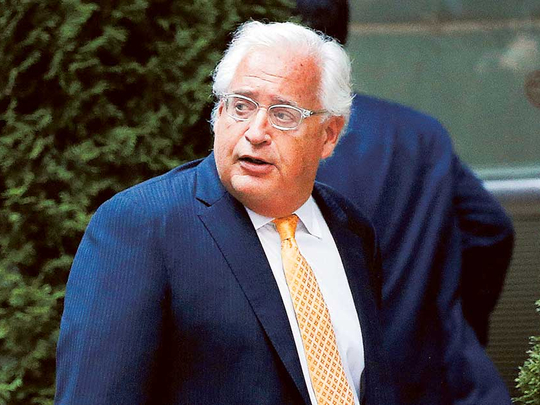
Washington: One day after President Donald Trump shook up US policy toward the Middle East, his pick for envoy to Israel will confront senators seeking clarity on the administration’s strategy for helping resolve the Israeli-Palestinian conflict.
David Friedman, a bankruptcy lawyer whose support for Israeli colonies and opposition to a two-state solution run counter to previous US positions, will be the first of Trump’s ambassadorial nominees to testify before the Senate Foreign Relations Committee when he heads to Capitol Hill on Thursday. He was nominated by the president even before Trump announced his pick for secretary of state, Rex Tillerson.
While Friedman, 58, will likely be approved by the Republican-led Senate, he’ll face tough questions over Trump’s position on a two-state solution for the conflict and his proposal to move the US embassy from Tel Aviv to occupied Jerusalem, a shift opposed by Arab allies who say it will kill prospects for peace.
The son of an Orthodox rabbi, Friedman is a fervent supporter of Israeli colonies, an opponent of Palestinian statehood and staunch defender of Israel’s government.
Five former US ambassadors to Israel have declared Friedman unqualified for job, citing his “extreme, radical positions” that include accusing former President Barack Obama and the entire State Department of anti-Semitism.
The ambassadors, who served Republican and Democratic presidents, also said in a letter sent on Wednesday to committee members that Friedman characterised supporters of J Street, a liberal Jewish group, as “kapos,” the Jews who cooperated with Nazis during the Holocaust.
“We believe the committee should satisfy itself that Mr Friedman has the balance and the temperament required to represent the United States as ambassador to Israel,” they wrote. The letter opposing Friedman’s nomination was signed by Thomas Pickering, William Harrop, Edward Walker, Daniel Kurtzer and James Cunningham.
“He has no experience and strong ideological views,” said Gerald Feierstein, a former deputy assistant secretary of state and now a resident expert at the Middle East Institute in Washington. “I’m sceptical that he has enough understanding and sensitivity to the issues of the region.”
The hearing comes a day after Trump met with Israeli Prime Minister Benjamin Netanyahu in Washington. During a joint news conference on Wednesday, Trump said he would be open to a Mideast peace agreement that doesn’t include separate states for Israel and the Palestinians, abandoning a US position that has underpinned more than a decade of failed negotiations between the two sides.
Netanyahu is trying to recalibrate ties with Israel’s top ally after eight years of high-profile clashes with former President Barack Obama, in part over Israel’s policies toward the Palestinians. He sees a chance for a warmer relationship with Trump, who shares his alarm over the Iran nuclear deal and Islamic extremists.
In the lead up to Thursday’s hearing, J-Street, a US Jewish organisation that has lobbied for the two-state solution, published on its website some of Friedman’s more controversial views and statements. Friedman is prepared to apologise in his hearing for his most inflammatory comments, according to a State Department official who asked not to be identified because the plans haven’t been made public.
As the head of an organisation that raises several million dollars a year for the controversial West Bank colony of Beit El, Friedman knows well the concerns of Israeli colonists. His pugnacious approach may also appeal to the Israeli government, said professor Eytan Gilboa, expert on US-Israel relations at Bar-Ilan University outside Tel Aviv.
“He’ll be able to present the Israeli position to the Trump administration, more than a professional ambassador would,” Gilboa said. However, he’ll still follow orders, he added. “Ambassadors are civil servants — they fulfil what the president tells them to do. They’re not independent entities.”












